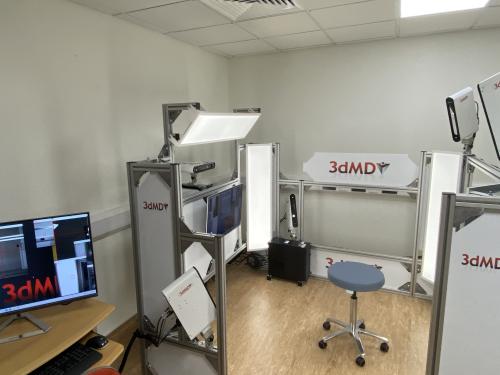
North Bristol NHS Trust (NBT) has opened an innovative new centre for 3D scanning and printing, providing state-of-the-art technology for the development of bespoke prosthetics and devices.
Based in the Beckspool building in Frenchay, the centre brings together expertise for digital planning, design and manufacturing of patient-specific devices and medical models to enable safer and more accurate patient care.
This is the first time in the UK that 3D scanning, design and printing has been brought together in one NHS location.
The Bristol 3D Medical Centre not only provides scientific and technical support to NBT and University Hospitals Bristol and Weston NHS Foundation Trust (UHBW), but also the South West region and the rest of the UK, offering state-of-the-art digital technology and specialist Reconstructive Scientists’ expertise.
Patient David Richards from Devon has already used the services at the new centre, after the left side of his face was burned in an incident that also led to his eye being removed. David has been using the services at NBT for a few years and is now receiving treatment at the new centre. David has received a 3D scan which helps to understand how his scars are healing and any changes to his face.
Surface scanning also helps younger patients who would struggle to stay still during the previous processes.
Amy Davey, Senior Reconstructive Scientist at NBT, said: “Surface scanning patients for prosthetics means that patients can be scanned while moving, and this technology can use that movement to aid the prostheses to accommodate movement. The old method of producing a helmet for babies with plagiocephaly and brachycephaly required a general anaesthetic to eliminate movement whilst the mould of the baby’s skull was produced. With 3D surface scanning, the baby can move around freely and happily and a 3D printed helmet subsequently produced from that scan.”
Amy added that with scanning, they can “not only look in a 2D form, in terms of appearance, but in a 3D form in terms of realistic reconstruction.”
As part of his treatment, David has received a 3D prothesis that fits the space on his face and mimics his hair colour, eye colour and skin.
Amy said: “3D printing also uses advanced plastic resins whose properties closely resemble those of the bones themselves, allowing a far more ’natural’ implant or prosthetic.
“3D scanning over time can be useful in quantifying a patient’s progress and enabling any necessary adjustments to be carried out, particularly for treating and monitoring scars.” The 3D Medical Centre is not only developing new techniques but also finding many new applications.
3D models can be made to help surgeons prepare for surgery. For example, a model of a damaged kidney showing not only the area to be removed but highlighting nerves and blood vessels as a tool to plan the operation.
The majority of the equipment within the centre is funded by generous donations to Southmead Hospital Charity, the official charity of North Bristol NHS Trust.
Amy shared how important the funding is for the centre and what it means for patients:
“The funding from Southmead Hospital Charity enabled us to purchase the main 3D surface scanner, as well as the accompanying software, desktop surface scanner and AR headset,” she said.
“We will start using it to treat patients requiring prosthetics and reconstruction, immediately increasing our current capacity for this work by 50%.
“We feel very fortunate to have received the funding from the charity, which will help us to provide great patient care by providing a more relaxing and less intrusive scanning process and, as the equipment is state-of-the-art, it ensures that ourselves and UHBW are providing healthcare that is fit for the future.”
Sally Bennett, Director of Southmead Hospital Charity, commented: “We are thrilled that we have secured funding for the equipment within the centre and are delighted that it will have a large positive impact on the experience of patients.”
Professor Tim Whittlestone, Chief Medical Officer said: “I am delighted that the Bristol 3D Medical Centre is now open and operational. On behalf of the Bristol NHS Group of hospitals, I would like to thank key donors to Southmead Hospital Charity. Thanks to these donations, this has become one of the first centres of its kind in the UK and another innovative partnership between NBT and UHBW.”
